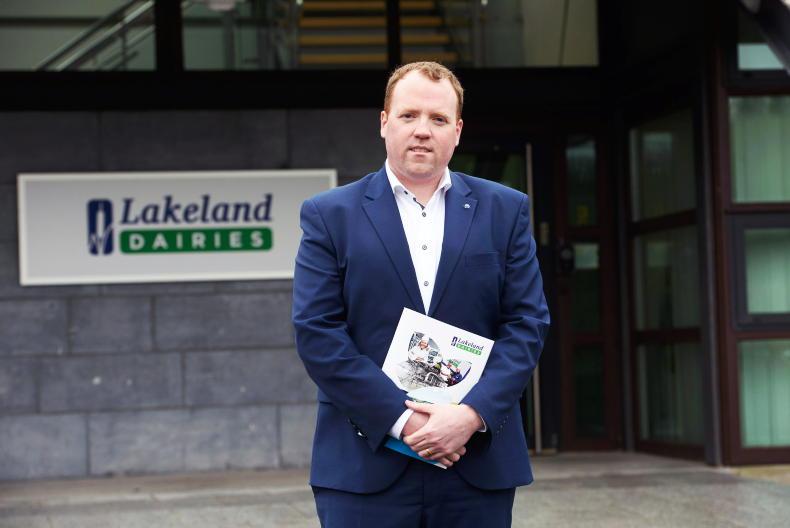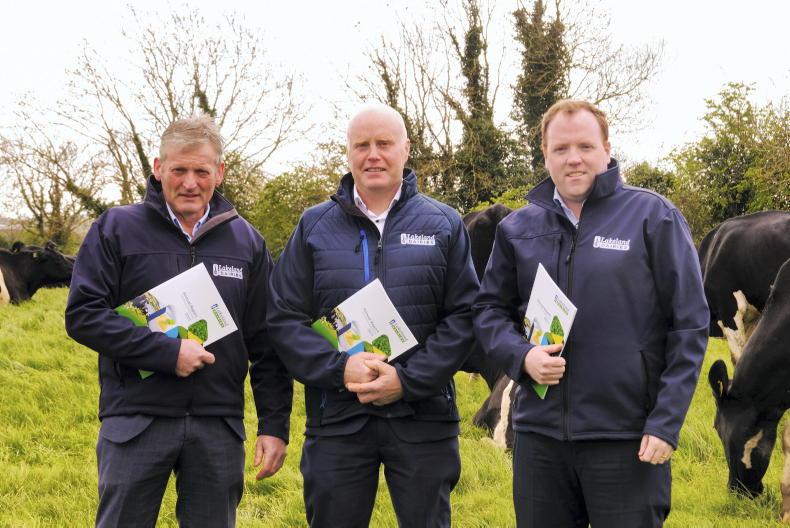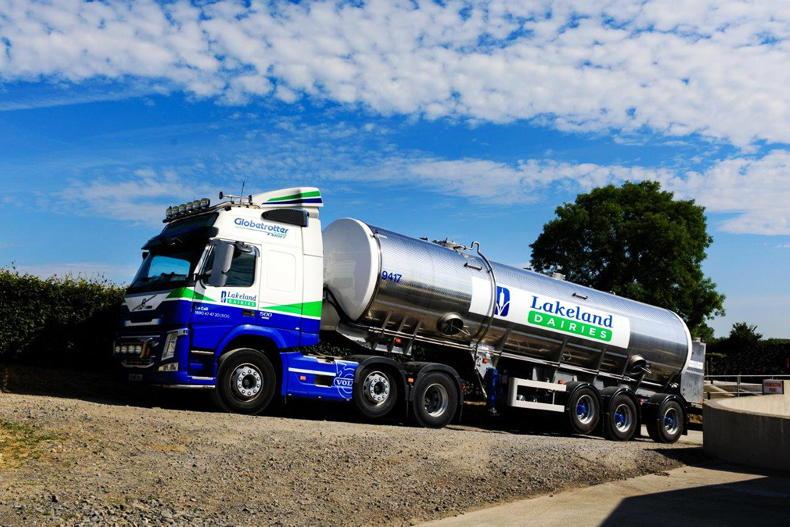Lakeland Dairies reported an operating profit, before exceptional items and interest costs, of €14.5m in 2023. Turnover at the cross-border operation dropped from €1.9bn in 2022 to €1.6bn.
Once those exceptional costs are taken into account, the final figure for the year is a loss after tax of just over €8m.
Group chief executive Colin Kelly emphasised that the exceptional costs are exactly that – once-off costs that will not recur on an ongoing basis.
The costs have been incurred as part of the co-op’s previously announced restructuring of its processing footprint which includes the closure of sites at Monaghan, Lough Egish and Banbridge.
The co-op’s milk pool dropped 2.5% to approximately 2bn litres.
The drop in supply was both skewed towards the second half of the year, after a strong start to 2023, and towards the Republic of Ireland which saw an almost 10% drop. Supplies from Northern Ireland held relatively stable across the year.
Similar pattern
Kelly told the Irish Farmers Journal that they are seeing a similar pattern for the start of this year with Northern Ireland supplies even slightly ahead of where they were at this time in 2023 while there is a 4% to 5% decline in deliveries from the Republic of Ireland.
He did say, however, that protein was well back in milk delivered so far this year.
Lakeland said that it paid €800m to milk suppliers last year, with a little more than half of that to farmers in Northern Ireland.
The co-op paid an average milk price, excluding VAT, of 37.86c/l in the Republic of Ireland in 2023, down from 54.03c/l in 2022.
In Northern Ireland, the average milk price was 34.22p/l, down from 45.20p/l.

Colin Kelly, group CEO, Lakeland Dairies.
Interview: Colin Kelly, Lakeland CEO
Lakeland CEO Colin Kelly’s assessment of the co-op’s 2023 is that the performance has to be taken in context.
“Those are not good results when compared to the prior year, but if you understand the context of where things were at, it was never going to be an increase in dairy processing results, given where the market was and where it ended up,” he told the Irish Farmers Journal.
“In the early months of the year, we saw a difference between the market price and milk price [paid to suppliers] that were different by close to 20c/l.
“You don’t have to be a mathematician to figure out that you were talking about a big, big red number for Lakeland Dairies in the early months of last year, so we had a fair hill to climb in the second half of the year.”
He said that it was a fair performance for Lakeland to end the year where it did.
During the year Lakeland finalised the co-op’s business and sustainability strategy and Kelly said the business started to delivery on those.
“The key decision we made was to right-size our footprint. Those decisions weren’t taken lightly, but ultimately, we made the right decisions for the business.
“The decision to close the three facilities, which led to exceptional costs of just over €14.5m, will give us an on-going benefit of €7m per year.”
Kelly said that Lakeland wants to have fewer, but bigger, sites into the future. Internally, Lakeland are calling them “supersites”.
He emphasised that this does not mean that he sees milk supply continuing to fall over the coming years.
We all have to be as lean as we can
“Milk will, at worst, flatline. But the worry is that costs are increasing at a pace that they haven’t in the previous decade. It is not beyond the realms of possibility that costs will increase by 5% to 6% every year while the thing that drives the business – milk supply – is flatlining.
“We all have to be as lean as we can.”
Kelly agreed that processing costs, particularly energy, were actually lower in 2023 than the previous year, but he made the point that while energy costs have dropped from 4c/l for milk processing in 2022 to 3c/l last year, they are still well ahead of the 2c/l that existed in the years before the Russian invasion of Ukraine.
He said that given a static milk supply, Lakeland has to be more efficient in how they process it and has to extract as much value as it can from the market.
He cited the 2024 purchase of De Brandt butter as a move towards adding product value.
When asked if the moves in 2023 were the end of “right-sizing” the business, Kelly said that he feels that it should be.
However, the five-year plan is based on a static milk supply.
Kelly admitted that while he is not certain of the size of the impact that a further cut in derogation would have on Lakeland’s milk pool, the effect would certainly be negative.
Milk supply
On milk supply, Kelly is keen to encourage milk solids, suggesting that in a few years Lakeland might be talking more about milk solids than total supply.
Kelly said there are plans for further acquisitions over the coming years. He said there is a pipeline, but nothing is imminent.
“We are very clear that any acquisition will be about capability. The word ‘capacity’ is not spoken about in Lakeland Dairies.
“We will only be looking for things that bring capability to the business that we don’t have already or bring synergies to the products we have already.”
Looking ahead for the industry as a whole, Kelly said: “If I look ahead, I think there has to be fewer processors on this island as a whole. I don’t see much change in the next five years, but certainly in the next six to 10.
“If we were sitting down and thinking, would we want a merger? We wouldn’t. But we would want milk. I think most people are in that situation where they have capacity and capability, but they are starting to get a little nervous about milk.”
He insists he is not very negative about the outlook for milk and feels that the difficult start to 2024 from a weather perspective is maybe colouring some people’s view of the overall situation.
For the ‘right size’ to be correct, milk supply needs to remain static
Lakeland’s change of ambition away from capacity towards adding value is a common theme among processors this year.
With such a lack of clarity over the future of milk supplies on the island of Ireland, this certainly makes sense from a tactical point of view.
However, when Kelly says that Lakeland has “right-sized” its business, he seems to be talking about a business that is the right size for 2023.
For that right size to be correct over the medium- to longer-term, the milk supply also needs to remain static. This variable is to a large extent out of Lakeland’s hands.

Lakeland vice-chair Keith Agnew, Lakeland chair Niall Matthews and Lakeland CEO Colin Kelly.
Experience over recent years, and recent projections, shows that on a national level, the supply of milk has been and will remain volatile. Should there be a further cut in derogation, then Lakeland will in all likelihood find itself again at the wrong size.
To combat that, the co-op will either have to get more milk – in what could be a very competitive market for milk – or implement more costs.
With other co-ops in the same boat, the question of what the right size is will be the key determinant of long-term sustainability. Where that size is at the moment, due particularly to the lack of policy certainty, is a complete unknown.
Operating profit down to €14.5m.Loss of €8m for the year once exceptional costs are factored in.Milk pool down by 2.5%.Average milk price of 37.86c/l.
Lakeland Dairies reported an operating profit, before exceptional items and interest costs, of €14.5m in 2023. Turnover at the cross-border operation dropped from €1.9bn in 2022 to €1.6bn.
Once those exceptional costs are taken into account, the final figure for the year is a loss after tax of just over €8m.
Group chief executive Colin Kelly emphasised that the exceptional costs are exactly that – once-off costs that will not recur on an ongoing basis.
The costs have been incurred as part of the co-op’s previously announced restructuring of its processing footprint which includes the closure of sites at Monaghan, Lough Egish and Banbridge.
The co-op’s milk pool dropped 2.5% to approximately 2bn litres.
The drop in supply was both skewed towards the second half of the year, after a strong start to 2023, and towards the Republic of Ireland which saw an almost 10% drop. Supplies from Northern Ireland held relatively stable across the year.
Similar pattern
Kelly told the Irish Farmers Journal that they are seeing a similar pattern for the start of this year with Northern Ireland supplies even slightly ahead of where they were at this time in 2023 while there is a 4% to 5% decline in deliveries from the Republic of Ireland.
He did say, however, that protein was well back in milk delivered so far this year.
Lakeland said that it paid €800m to milk suppliers last year, with a little more than half of that to farmers in Northern Ireland.
The co-op paid an average milk price, excluding VAT, of 37.86c/l in the Republic of Ireland in 2023, down from 54.03c/l in 2022.
In Northern Ireland, the average milk price was 34.22p/l, down from 45.20p/l.

Colin Kelly, group CEO, Lakeland Dairies.
Interview: Colin Kelly, Lakeland CEO
Lakeland CEO Colin Kelly’s assessment of the co-op’s 2023 is that the performance has to be taken in context.
“Those are not good results when compared to the prior year, but if you understand the context of where things were at, it was never going to be an increase in dairy processing results, given where the market was and where it ended up,” he told the Irish Farmers Journal.
“In the early months of the year, we saw a difference between the market price and milk price [paid to suppliers] that were different by close to 20c/l.
“You don’t have to be a mathematician to figure out that you were talking about a big, big red number for Lakeland Dairies in the early months of last year, so we had a fair hill to climb in the second half of the year.”
He said that it was a fair performance for Lakeland to end the year where it did.
During the year Lakeland finalised the co-op’s business and sustainability strategy and Kelly said the business started to delivery on those.
“The key decision we made was to right-size our footprint. Those decisions weren’t taken lightly, but ultimately, we made the right decisions for the business.
“The decision to close the three facilities, which led to exceptional costs of just over €14.5m, will give us an on-going benefit of €7m per year.”
Kelly said that Lakeland wants to have fewer, but bigger, sites into the future. Internally, Lakeland are calling them “supersites”.
He emphasised that this does not mean that he sees milk supply continuing to fall over the coming years.
We all have to be as lean as we can
“Milk will, at worst, flatline. But the worry is that costs are increasing at a pace that they haven’t in the previous decade. It is not beyond the realms of possibility that costs will increase by 5% to 6% every year while the thing that drives the business – milk supply – is flatlining.
“We all have to be as lean as we can.”
Kelly agreed that processing costs, particularly energy, were actually lower in 2023 than the previous year, but he made the point that while energy costs have dropped from 4c/l for milk processing in 2022 to 3c/l last year, they are still well ahead of the 2c/l that existed in the years before the Russian invasion of Ukraine.
He said that given a static milk supply, Lakeland has to be more efficient in how they process it and has to extract as much value as it can from the market.
He cited the 2024 purchase of De Brandt butter as a move towards adding product value.
When asked if the moves in 2023 were the end of “right-sizing” the business, Kelly said that he feels that it should be.
However, the five-year plan is based on a static milk supply.
Kelly admitted that while he is not certain of the size of the impact that a further cut in derogation would have on Lakeland’s milk pool, the effect would certainly be negative.
Milk supply
On milk supply, Kelly is keen to encourage milk solids, suggesting that in a few years Lakeland might be talking more about milk solids than total supply.
Kelly said there are plans for further acquisitions over the coming years. He said there is a pipeline, but nothing is imminent.
“We are very clear that any acquisition will be about capability. The word ‘capacity’ is not spoken about in Lakeland Dairies.
“We will only be looking for things that bring capability to the business that we don’t have already or bring synergies to the products we have already.”
Looking ahead for the industry as a whole, Kelly said: “If I look ahead, I think there has to be fewer processors on this island as a whole. I don’t see much change in the next five years, but certainly in the next six to 10.
“If we were sitting down and thinking, would we want a merger? We wouldn’t. But we would want milk. I think most people are in that situation where they have capacity and capability, but they are starting to get a little nervous about milk.”
He insists he is not very negative about the outlook for milk and feels that the difficult start to 2024 from a weather perspective is maybe colouring some people’s view of the overall situation.
For the ‘right size’ to be correct, milk supply needs to remain static
Lakeland’s change of ambition away from capacity towards adding value is a common theme among processors this year.
With such a lack of clarity over the future of milk supplies on the island of Ireland, this certainly makes sense from a tactical point of view.
However, when Kelly says that Lakeland has “right-sized” its business, he seems to be talking about a business that is the right size for 2023.
For that right size to be correct over the medium- to longer-term, the milk supply also needs to remain static. This variable is to a large extent out of Lakeland’s hands.

Lakeland vice-chair Keith Agnew, Lakeland chair Niall Matthews and Lakeland CEO Colin Kelly.
Experience over recent years, and recent projections, shows that on a national level, the supply of milk has been and will remain volatile. Should there be a further cut in derogation, then Lakeland will in all likelihood find itself again at the wrong size.
To combat that, the co-op will either have to get more milk – in what could be a very competitive market for milk – or implement more costs.
With other co-ops in the same boat, the question of what the right size is will be the key determinant of long-term sustainability. Where that size is at the moment, due particularly to the lack of policy certainty, is a complete unknown.
Operating profit down to €14.5m.Loss of €8m for the year once exceptional costs are factored in.Milk pool down by 2.5%.Average milk price of 37.86c/l. 







 This is a subscriber-only article
This is a subscriber-only article










SHARING OPTIONS: